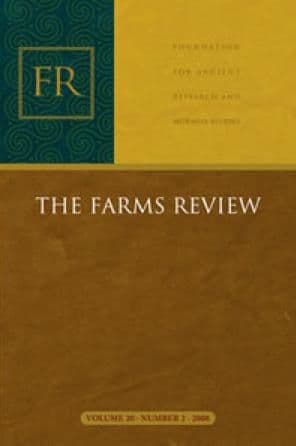Journal
Rodney Stark, The Rise of Christianity: A Sociologist Reconsiders History

Title
Rodney Stark, The Rise of Christianity: A Sociologist Reconsiders History
Publication Type
Journal Article
Year of Publication
1998
Authors
Chadwick, Bruce A. (Primary)
Journal
FARMS Review
Pagination
156-157
Volume
10
Issue
2
Abstract
Review of The Rise of Christianity: A Sociologist Reconsiders History (1996), by Rodney Stark.
The Rise of Christianity: A Sociologist Reconsiders History
|
Stark combines historical and social science analyses to produce a fascinating account of the rise of Christianity in the four centuries following its founding. He challenges, with data and logic, many cherished myths about the emergence of Christianity. The book opens with an intriguing discussion that the well-to-do, not the socially deprived underclass, were overrepresented among early converts to Christianity. Obviously, this more influential membership strengthened the early Christian movement. In a subsequent chapter, Stark contends the mission to the Jews was much more successful than generally thought. He “cautiously suggest[s] that a very substantial conversion of the Jews actually did take place” (p. 70). His analysis indicates that Jews in the Diaspora provided the preponderance of the early converts which contribution sustained the initial growth of Christianity. Stark makes a pervasive case that the misery of the urban life of the times, as well as natural disasters such as epidemics, earthquakes, and fires, contributed significantly to the emergence of Christianity. The argument is that Christians more efficiently dealt with such life-threatening conditions and thus enjoyed a higher quality of life and a longer life span. He cites inscriptions on grave markers as evidence that Christians in the early times lived longer than their non-Christian neighbors. This favorable quality of life was a powerful missionary attraction that drew converts to the church. The fact that members lived longer also increased their proportion of the population. Christian views about women and the resultant relationships between men and women, according to Stark, generated higher natural growth among members of the early church than among the general population. He discusses how Christian family practices, especially the rejection of female infanticide, increased the number of women who survived to child-bearing age. In addition, Stark argues, Christians had lower rates of contraception and abortion, which increased their fertility. Thus Christian women bore considerably more children than non-Christian women. Finally, the book points out how martyrs’ pious acceptance of torture and agonizing death was interpreted by member and nonmember alike as evidence of God’s miraculous support of Christianity. Members’ commitment to Christianity was enhanced, and nonmembers were convincingly impressed, by the faith of the martyrs. In most of the chapters Stark derives two or three social science hypotheses that link characteristics such as membership in the Christian church to greater longevity. These hypotheses facilitate the development of a general theory or model explaining the emergence of new religions. Of special interest to the Latter-day Saint reader is Stark’s focus on the LDS Church and its growth in the nineteenth and twentieth centuries as a case study illustrating several of the social science hypotheses. He presents some interesting data about the rather spectacular growth of the LDS Church and makes some interesting projections of future expansion. This book is an interesting read. Stark actually brings off the synthesis of historical and social science analyses and gives the reader some fascinating insights into the emergence of Christianity to the dominant religious force in the modern Western world.
Subject Keywords
Bibliographic Citation
Terms of use
Items in the BMC Archive are made publicly available for non-commercial, private use. Inclusion within the BMC Archive does not imply endorsement. Items do not represent the official views of The Church of Jesus Christ of Latter-day Saints or of Book of Mormon Central.